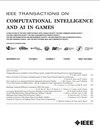博弈位置评估无知识学习的协同进化CMA-ES
Q2 Computer Science
IEEE Transactions on Computational Intelligence and AI in Games
Pub Date : 2016-12-01
DOI:10.1109/TCIAIG.2015.2464711
引用次数: 7
摘要
在对抗游戏的无知识策略学习中观察到的共同进化算法的一个弱点是,它们在学习参数数量方面的可扩展性很差。本文研究了协方差矩阵自适应进化策略(一种强大的连续优化算法)在多大程度上可以缓解这一问题。特别地,我们在竞争性协同进化设置中使用该算法,将此设置表示为Co-CMA-ES。我们将其应用于奥赛罗博弈的位置评价函数的学习,发现与普通(协同)进化策略相比,co - cma - es学习速度更快,找到了更优的博弈策略,并且具有更好的可扩展性。它的优点是显而易见的,特别是对于数百维的大参数空间。对于奥赛罗来说,将Co-CMA-ES与实验调谐的非随机系统n元网络相结合,显著提高了当前的技术水平。我们的最佳策略比迄今为止发布的所有其他奥赛罗1-ply玩家的表现都要好得多,无论他们之间的循环赛是包含一组固定的初始位置还是包含随机对手的标准初始位置。这些结果显示了cma - es驱动的共同进化的巨大潜力,这可能也可以在其他游戏中得到利用。本文章由计算机程序翻译,如有差异,请以英文原文为准。
Coevolutionary CMA-ES for Knowledge-Free Learning of Game Position Evaluation
One weakness of coevolutionary algorithms observed in knowledge-free learning of strategies for adversarial games has been their poor scalability with respect to the number of parameters to learn. In this paper, we investigate to what extent this problem can be mitigated by using Covariance Matrix Adaptation Evolution Strategy, a powerful continuous optimization algorithm. In particular, we employ this algorithm in a competitive coevolutionary setup, denoting this setting as Co-CMA-ES. We apply it to learn position evaluation functions for the game of Othello and find out that, in contrast to plain (co)evolution strategies, Co-CMA-ES learns faster, finds superior game-playing strategies and scales better. Its advantages come out into the open especially for large parameter spaces of tens of hundreds of dimensions. For Othello, combining Co-CMA-ES with experimentally-tuned derandomized systematic n-tuple networks significantly improved the current state of the art. Our best strategy outperforms all the other Othello 1-ply players published to date by a large margin regardless of whether the round-robin tournament among them involves a fixed set of initial positions or the standard initial position but randomized opponents. These results show a large potential of CMA-ES-driven coevolution, which could be, presumably, exploited also in other games.
求助全文
通过发布文献求助,成功后即可免费获取论文全文。
去求助
来源期刊

IEEE Transactions on Computational Intelligence and AI in Games
COMPUTER SCIENCE, ARTIFICIAL INTELLIGENCE-COMPUTER SCIENCE, SOFTWARE ENGINEERING
CiteScore
4.60
自引率
0.00%
发文量
0
审稿时长
>12 weeks
期刊介绍:
Cessation. The IEEE Transactions on Computational Intelligence and AI in Games (T-CIAIG) publishes archival journal quality original papers in computational intelligence and related areas in artificial intelligence applied to games, including but not limited to videogames, mathematical games, human–computer interactions in games, and games involving physical objects. Emphasis is placed on the use of these methods to improve performance in and understanding of the dynamics of games, as well as gaining insight into the properties of the methods as applied to games. It also includes using games as a platform for building intelligent embedded agents for the real world. Papers connecting games to all areas of computational intelligence and traditional AI are considered.
 求助内容:
求助内容: 应助结果提醒方式:
应助结果提醒方式:


